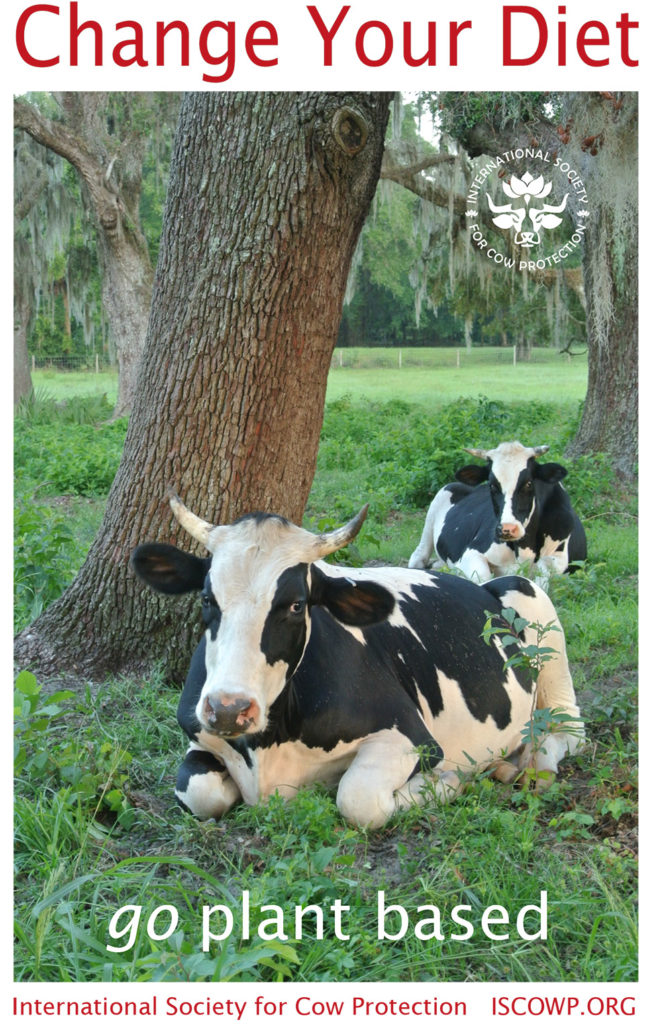
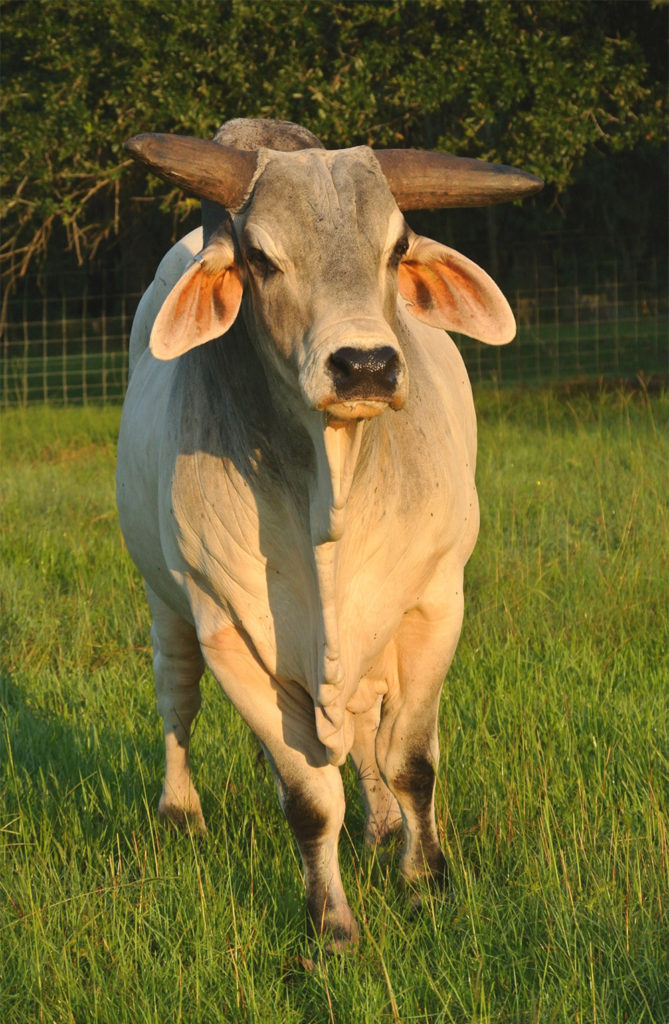
ISCOWP Profile
The International Society for Cow Protection, Inc. (ISCOWP) was incorporated in the USA, March 1990, as a 501 (c) (3) non-profit, tax exempt organization. William and Irene Dove (Balabhadra das and Chayadevi dasi) are its founders. They are disciples of His Divine Grace A.C. Bhaktivedanta Swami Prabhupada, the Founder Acharya of the International Society for Krishna Consciousness (ISKCON). Through their spiritual master’s teachings, they have imbibed the practices and benefits, both spiritual and material, of lifetime cow protection. Cow protection means enabling cows to live out their natural lives with love and affection. The tenets of cow protection are universal and nonsectarian, available to all regardless of race, creed, or nationality.
Mailing Address
ISCOWP
7016 SE 92 Terrace
Gainesville FL, USA, 32641
Phone 352.792.6777
Donations and Financial Reports
USA tax deductible number:23-2604082. A copy of each year’s ISCOWP IRS Form 990-EZ is available at guidestar.org
To donate
iscowp.org/donations
Address check to ISCOWP and send to ISCOWP mailing address
E-newsletter Monthly
Subscribe on our website, iscowp.org/subscribe
Store
iscowp.org/store
Adopt A Cow
iscowp.org/adopt-a-cow
Internet
[email protected]
iscowp.org
youtube.com/user/ISCOWP108
internationalsocietyforcowprotectioniscowp
www.instagram.com/iscowp
Dear Friends,
We believe rescuing cows from slaughter and then caring for them their entire lives (a cow can live for 25 years or more) until their natural death is a humane, compassionate act and can only help the planet towards a more peaceful existence.
Besides maintaining our local sanctuary, we encourage and educate others on how they, too, can care for cows. William E. Dove, ISCOWP president, has traveled widely to counsel future and current cow protection programs. We also offer assistance through conference calls, seminars, and literature.
Compared to the numbers of cows bred daily worldwide, what we are doing, both locally and beyond, is less than a mere drop in the bucket. Therefore we encourage people to change their diet to a plant-based one. Not only do we encourage eliminating meat from one’s diet, but we also encourage eliminating, or at least decreasing milk (and its byproducts). Diet change alone can make a significant difference in the number of cows bred and tortured each day to put meat, milk, and its byproducts on the dinner table. When there is less demand, there will be less supply. The result is less suffering for Mother Cow.
This booklet gives much information on how your diet change will affect your health, environment, and the lives of so many animals. Sources like Down to Earth, NPR, New York Times, Science, United Nations, and the Vedic literature are quoted.
Your Editor, Irene M. Dove (Chayadevi)
Thanks to an abundance of scientific research that demonstrates the health and environmental benefits of a plant-based diet, even the federal government recommends that we consume most of our calories from grain products, vegetables and fruits.
And no wonder: An estimated 70 percent of all diseases, including one-third of all cancers, are related to diet. A vegetarian diet reduces the risk for chronic degenerative diseases such as obesity, coronary artery disease, high blood pressure, diabetes and certain types of cancer including colon, breast, prostate, stomach, lung and esophageal cancer.
Why go vegetarian? Chew on these reasons:
You’ll Ward Off Disease. Vegetarian diets are more healthful than the average American diet, particularly in preventing, treating or reversing heart disease and reducing the risk of cancer. A low-fat vegetarian diet is the single most effective way to stop the progression of coronary artery disease or prevent it entirely. Cardiovascular disease kills 1 million Americans annually and is the leading cause of death in the United States.
But the mortality rate for cardiovascular disease is lower in vegetarians than in nonvegetarians, says Joel Fuhrman, MD, author of Eat to Live: The Revolutionary Formula for Fast and Sustained Weight Loss. A vegetarian diet is inherently healthful because vegetarians consume less animal fat and cholesterol (vegans consume no animal fat or cholesterol) and instead consume more fiber and more antioxidantrich produce—another great reason to listen to Mom and eat your veggies!
You’ll Keep Your Weight Down. The standard American diet—high in saturated fats and processed foods and low in plantbased foods and complex carbohydrates— is making us fat and killing us slowly. According to the Centers for Disease Control and Prevention (CDC) and a division of the CDC, the National Center for Health Statistics, 64 percent of adults and 15 percent of children aged 6 to 19 are overweight and are at risk of weightrelated ailments including heart disease, stroke and diabetes.
A study conducted from 1986 to 1992 by Dean Ornish, MD, president and director of the Preventive Medicine Research Institute in Sausalito, California, found that overweight people who followed a low-fat, vegetarian diet lost an average of 24 pounds in the first year and kept off that weight 5 years later. They lost the weight without counting calories or carbs and without measuring portions or feeling hungry.
You’ll Live Longer. If you switch from the standard American diet to a vegetarian diet, you can add about 13 healthy years to your life, says Michael F. Roizen, MD, author of The RealAge Diet: Make Yourself Younger with What You Eat. “People who consume saturated, four-legged fat have a
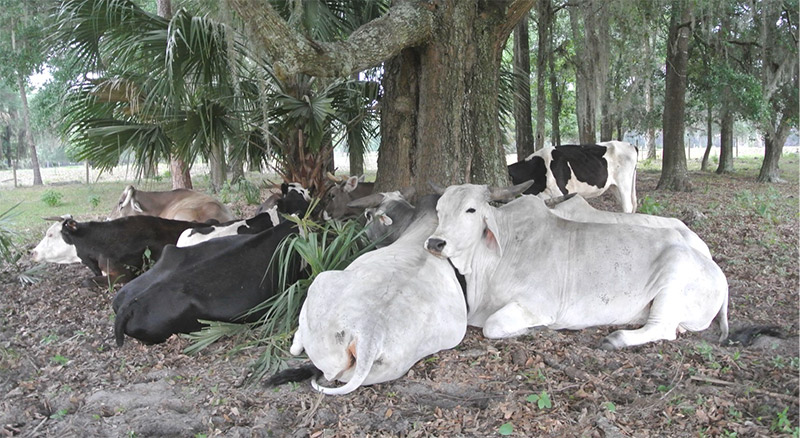
shorter life span and more disability at the end of their lives. Animal products clog your arteries, zap your energy and slow down your immune system. Meat eaters also experience accelerated cognitive and sexual dysfunction at a younger age.”
Want more proof of longevity? Residents of Okinawa, Japan, have the longest life expectancy of any Japanese and likely the longest life expectancy of anyone in the world, according to a 30-year study of more than 600 Okinawan centenarians. Their secret: a low-calorie diet of unrefined complex carbohydrates, fiber-rich fruits and vegetables, and soy.
You’ll Build Strong Bones. When there isn’t enough calcium in the bloodstream, our bodies will leach it from existing bone. The metabolic result is that our skeletons will become porous and lose strength over time. Most health care practitioners recommend that we increase our intake of calcium the way nature intended—through foods. Foods also supply other nutrients such as phosphorus, magnesium and vitamin D that are necessary for the body to absorb and use calcium.
People who are mildly lactose-intolerant can often enjoy small amounts of dairy products such as yogurt, cheese and lactose-free milk. But if you avoid dairy altogether, you can still get a healthful dose of calcium from dry beans, tofu, soymilk and dark green vegetables such as broccoli, kale, collards and turnip greens.
You’ll Reduce Your Risk of FoodBorne Illnesses. The CDC reports that food-borne illnesses of all kinds account for 76 million illnesses a year, resulting in 325,000 hospitalizations and 5,000 deaths in the United States. According to the US Food and Drug Administration (FDA), foods rich in protein such as meat, poultry, fish and seafood are frequently involved in food-borne illness outbreaks
You’ll Ease The Symptoms of Menopause. Many foods contain nutrients beneficial to perimenopausal and menopausal women. Certain foods are rich in phytoestrogens, the plant-based chemical compounds that mimic the behavior of estrogen. Since phytoestrogens can increase and decrease estrogen and progesterone levels, maintaining a balance of them in your diet helps ensure a more comfortable passage through menopause. Soy is by far the most abundant natural source of phytoestrogens, but these compounds also can be found in hundreds of other foods such as apples, beets, cherries, dates, garlic, olives, plums, raspberries, squash and yams. Because menopause is also associated with weight gain and a slowed metabolism, a low-fat, high-fiber vegetarian diet can help ward off extra pounds.
You’ll Have More Energy. Good nutrition generates more usable energy to keep pace with the kids, tackle that home improvement project or have better sex more often, Michael F. Roizen, MD, says in The RealAge Diet. Too much fat in your bloodstream means that arteries won’t open properly and that your muscles won’t get enough oxygen.
The result? You feel zapped. Balanced vegetarian diets are naturally free of cholesterol-laden, artery-clogging animal products that physically slow us down and keep us hitting the snooze button morning after morning. And because whole grains, legumes, fruits and vegetables are so high in complex carbohydrates, they supply the body with plenty of energizing fuel.
You’ll Be More ‘Regular.’ Eating a lot of vegetables necessarily means consuming more fiber, which pushes waste out of the body. Meat contains no fiber. People who eat lower on the food chain tend to have fewer instances of constipation, hemorrhoids and diverticulitis.
You’ll Avoid Toxic Chemicals. The EPA estimates that nearly 95 percent of the pesticide residue in the typical American diet comes from meat, fish and dairy products. Fish, in particular, contain carcinogens (PCBs, DDT) and heavy metals (mercury, arsenic, lead, cadmium) that can’t be removed through cooking or freezing.
Meat and dairy products can also be laced with steroids and hormones, so be sure to read the labels on the dairy products you purchase.
It’s a breeze. It’s almost effortless these days to find great-tasting and good-foryou vegetarian foods, whether you’re strolling the aisles of your local supermarket or walking down the street at lunchtime. If you need inspiration in the kitchen, look no further than the internet, your favorite bookseller or your local vegetarian society’s newsletter for culinary tips and great recipes. And if you’re eating out, almost any ethnic restaurant will offer vegetarian selections. In a hurry? Most fast food and fast casual restaurants now include healthful and inventive salads, sandwiches and entrees on their menus. So rather than asking yourself why go vegetarian, the real question is: Why haven’t you gone vegetarian? Vegetarian Times article, “Why Go Veg?”
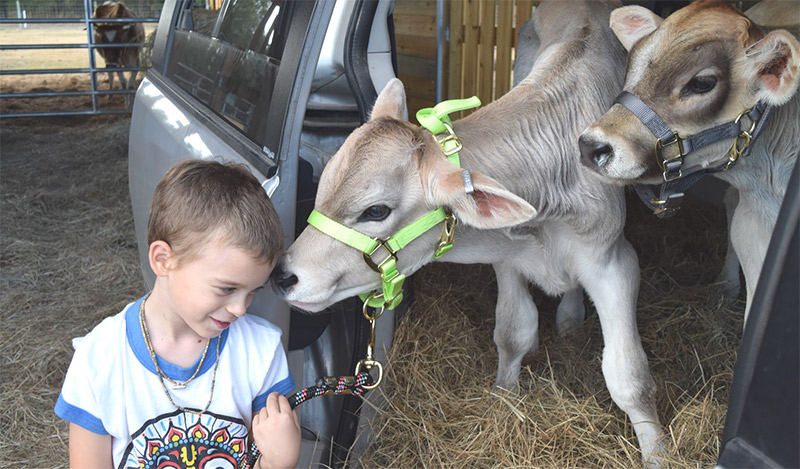
Reduce Global Warming
Global warming poses one of the most serious threats to the global environment ever faced in human history. Yet by focusing entirely on carbon dioxide emissions, major environmental organizations have failed to account for published data showing that other gases are the main culprits behind the global warming we see today. As a result, they are overlooking the fact that the single most important step an individual can take to reduce global warming [faster than any other means] is to adopt a vegetarian diet.1
In its 2006 report, the United Nations said raising animals for food generates more greenhouse gases than all the cars and trucks in the world combined.2
Avoid Excessive CO2 Production
According to the UN Report, when emissions from land use and land use change are included, the livestock sector accounts for 9 per cent of CO2 deriving from human -related activities, but produces a much larger share of even more harmful greenhouse gases.3
Reduce Methane/Nitrous Oxide Production
Cows and sheep are responsible for 37% of the total methane (23 times as warming as CO2) generated by human activity.4 With methane emissions causing nearly half of the planet’s human-induced warming, methane reduction must be a priority. The livestock industry generates 64 per cent of ammonia, which contributes significantly to acid rain.5
The livestock industry also generates 65 per cent of human-related nitrous oxide, which has 300 times the Global Warming Potential (GWP) of CO2. Most of this comes from manure.6
In addition to having the advantage of immediately reducing global warming, shifting away from methane-emitting food sources is much easier than cutting carbon dioxide 7:
First, greenhouse gas reductions through a vegetarian diet are limitless. In principle, even 100% reduction could be achieved with little negative impact. In contrast, similar cuts in carbon dioxide are impossible without devastating effects on the economy. Even the most ambitious carbon dioxide reduction strategies fall short of cutting emissions by half.
Second, a shift in diet can lower greenhouse gas emissions much more quickly than shifts away from the fossil fuel burning technologies that emit carbon dioxide. The turnover rate for most ruminant farm animals is one or two years, which means that decreases in meat consumption would result in an almost immediate drop in methane emissions. The turnover rate for cars and power plants, on the other hand, can be decades. Even if cheap, zero-emission fuel sources were available today, they would take many years to build and slowly replace the massive infrastructure our economy depends upon today.
Similarly, unlike carbon dioxide which can remain in the air for more than a century, methane cycles out of the atmosphere in just eight years. Therefore, lower methane emissions translate to cooling of the earth quickly.
Save Large Amounts of Water
Estimates of the water required to produce a kilo of beef vary, from 13,000 liters 8 up to 100,000 liters.9 Whichever figure you use, the damage is plain when you consider that the water required to produce a kilo of wheat is somewhere between 1,000-2,000 liters.
Avoid Further Pollution of Our Streams/Rivers/Oceans
Pollution of our waterways is caused by animal waste, antibiotics and hormones entering the water cycle alongside chemicals from tanneries, fertilizers, and the pesticides used to spray feed crops. Manure, or waste water containing manure, severely harms river and stream ecosystems. Farmed animals produce about 130 times as much excrement as the entire human population of the United States. Since factory farms don’t have sewage treatment systems as our cities and towns do, this concentrated slop ends up polluting our water, destroying our topsoil, and contaminating our air.10
Once factory farm pollutants—including nitrogen, phosphorus, antibiotics and pesticides—reach the waterways they cause a great deal of damage to aquatic and human life. Algal blooms are a particular problem, blocking waterways, using up oxygen as they decompose, and killing the natural populations of fish.11
In large amounts, animal waste can present major problems to the waterways and their surrounding environment. More than 2 billion tons of animal manure was produced worldwide during the late 1990s. Assuming average nitrogen content of around 5%, this makes 100 million tons of nitrogen 12 finding its way into our water system.
Fish farming contributes directly to the pollution of our waterways:
Large numbers of fish kept long-term in a single location produces a significant amount of feces concentrated in a small location, which can enter local waterways.
Because of parasite problems, some aquaculture operators frequently use strong antibiotic drugs to keep the fish alive. Many fish still die prematurely at rates of up to 30%.22 The residual presence of these drugs in human food products has become controversial because the use of antibiotics in food production is thought to increase the prevalence of antibiotic resistance in human diseases.
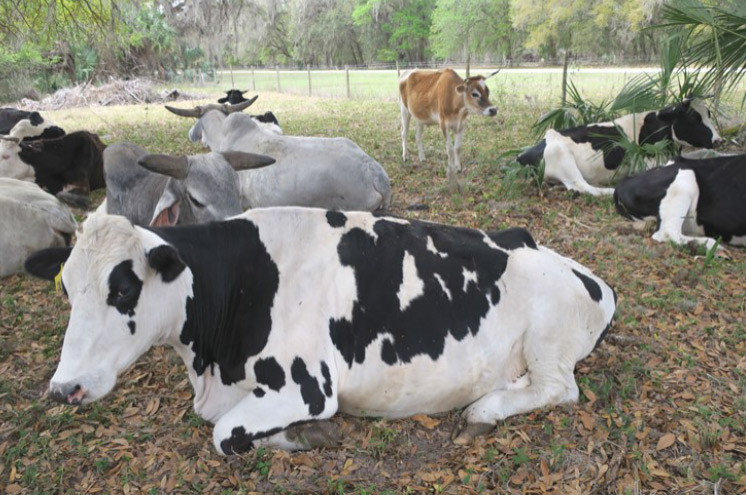

These drugs enter the food chain through direct consumption of the farmed fish itself and through the highly concentrated feces deposits that contaminate water supplies. Reports indicate that Scottish salmon farms alone have breached pollution limits more than 400 times in the past 3 years.23
Reduce Destruction of Topsoil & Tropical Rainforest
Thirty percent of the earth’s entire land surface—a massive 70% of all agricultural land—is used for rearing farmed animals. Much of this is grazing land that otherwise would host natural habitats such as valuable rainforests. And, of the entire world’s land suitable for growing crops that would otherwise directly feed humans, a third of it is used to produce feed for farmed animals.13
Livestock farming can lead to overgrazing causing soil erosion, desertification and deforestation14. Twenty percent of the world’s grazing land has already been designated as degraded due to the rearing of animals for their meat.15
Livestock production is responsible for 70% of deforestation in the Amazon region of Latin America, where rainforests are being cleared to create new pastures.16
Deforestation increases greenhouse gas emissions by releasing carbon previously stored in the trees. It is also a major driver in the loss of biodiversity – a pressing concern when one considers the fact that just a few species of livestock now account for about 20% of total terrestrial animal biomass.17
Help Ensure Environmental Sustainability There were approximately 6.5 billion people living on earth in 20052526 , and as the world’s population continues to grow, our requirement for food will also increase. Worldwide food production requires 30% of the total soil available, 20% of fossil fuel energy and a major part of the fresh water flow.27 Raising cattle is one of the most damaging components of agriculture.28 In addition to their gaseous emissions and manure products, it causes the most environmental damage of any non-human species through over-grazing, soil erosion, desertification and tropical deforestation. Studies on world food security estimate that an affluent diet containing meat requires up to 3 times as many resources as a vegetarian diet.29
Global production of meat has increased dramatically from 130 million tons in the late 1970s to 230 million tons in the year 2000.30 Meat is now the single largest source of animal protein in all affluent nations31 and demand for animal flesh is expected to be more than double by the year 2050.32 In order to meet this growing appetite, animals will no doubt be reared more intensively and cheaply with factory farming and aquaculture (fish farming) causing further pollution, water demand and land usage. If nothing is done, the environmental impact of meat production can only increase.
Adopting a vegetarian diet is an important tool to achieve environmental sustainability. Down to Earth “Top 10 Reasons It’s Green to Go Veggie.” Complete footnotes on their website: downtoearth.org
Reduce Destruction of Wildlife Habitats & Endangered Species
The livestock industry is responsible for widespread deforestation and cultivation of vast tracks of land. Wide-spread cultivation of the land ruins animals’ natural habitat and forces millions of them to be evicted from their homes each year, causing long-term harm to our wildlife.
Reduce Use of Antibiotics, Growth Hormones and Chemicals Farmed animals and fish are fed a wide variety of drugs to fatten them faster and to keep them alive in conditions that would otherwise kill them. These drugs enter the human food chain through direct consumption or through pollution of our waterways.The effect on humans of consuming low levels of these drugs during a lifetime is unknown but could be serious. Antibiotics given to farmed animals include penicillin, erythromycin, and inorganic arsenic (the most toxic form of arsenic).
Antibiotics contain significant amounts of the most carcinogenic form of arsenic. USDA researchers have found that “… eating two ounces of chicken per day—the equivalent of a third to a half of a boneless breast—exposes a consumer to 3 to 5 micrograms of inorganic arsenic, the element’s most toxic form.” Daily exposure to low doses of arsenic can cause cancer, dementia, neurological problems, and other ailments in humans. 18
Antibiotics reduce the amount of bacteria in animals’ intestines and preventing infection, to which crowded, stressed animals are predisposed. Routine antibiotic use leads to antibiotic-resistant bacteria, thereby reducing antibiotics’ effectiveness when treating people suffering from food poisoning or other infectious diseases. 19
Farmers give hormones to animals to increase growth and productivity. Widely used in the United States, these hormones are known to cause several types of cancer and reproductive dysfunction in humans.20 While U.S. farmers claim that using hormones to promote growth is safe, the European Union has prohibited this practice since 1995.21
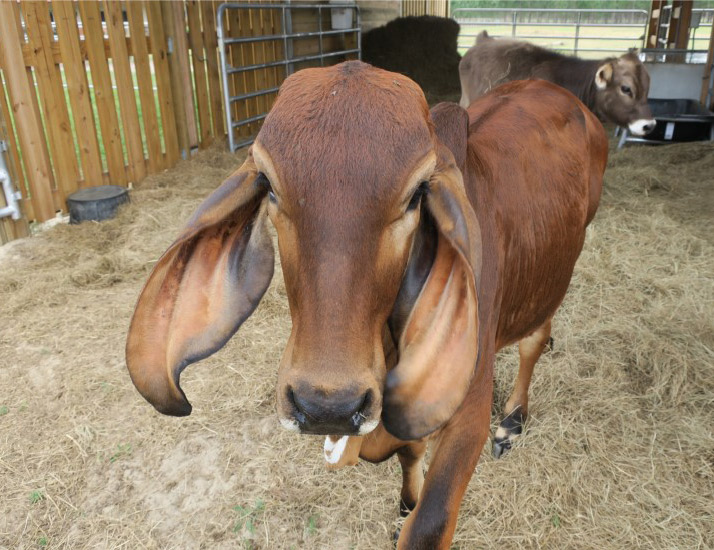
Reduce Ecological Footprint By choosing a vegetarian diet instead of one loaded with animal products, individuals can dramatically reduce the amount of land, water, and oil resources that they consume and the amount of pollution they otherwise might cause. Of
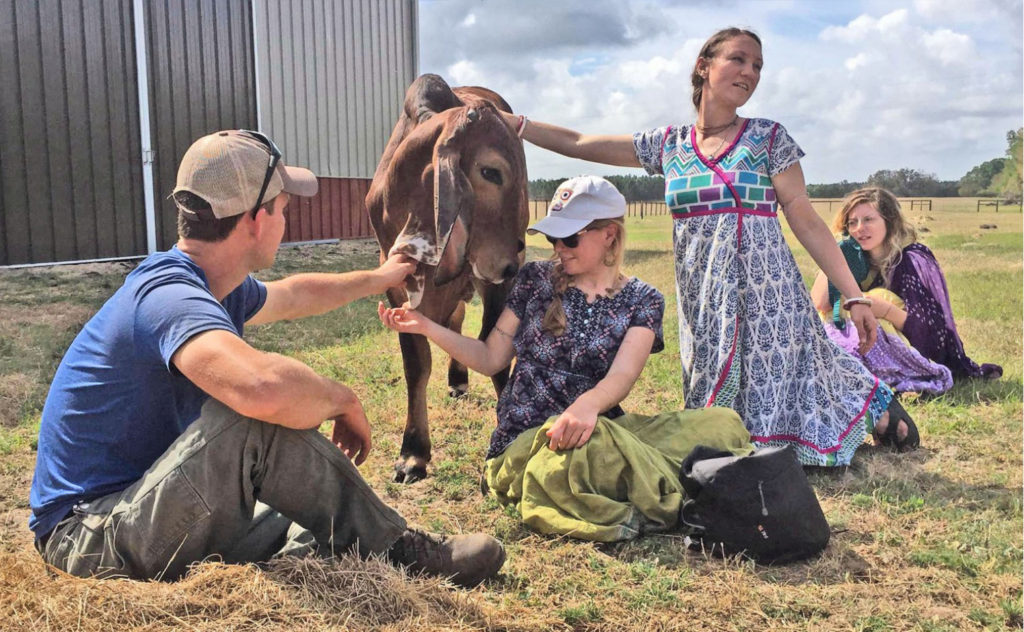
course, reducing one’s ecological footprint should also mean causing less harm to the Earth’s non-human inhabitants. By switching to a vegetarian diet, each person can save more than 100 animals each year from the horrific cruelty of the meat industry.24 downtoearth.org “Top 10 Reasons Why It’s Green to Go Veggie.”
Reduce Famine You’ll help reduce famine. About 70 percent of all grain produced in the United States is fed to animals raised for slaughter. The 7 billion livestock animals in the United States consume five times as much grain as is consumed directly by the American population. If all the grain currently fed to livestock were consumed directly by people, the number of people who could be fed would be nearly 800 million, says David Pimentel, professor of ecology at Cornell University. If the grain were exported, it would boost the US trade balance by $80 billion a year.
Thoughts to Ponder: Does Being Vegan Really Help Animals? More people are moving toward a plant based diet, owning in part to evidence about human health and environmental sustainability, and in part to the emerging scientific consensus on the breadth and depth of animal consciousness and sentience.
But how might choosing to eat fewer animals than ever before — or no animals at all (vegetarian), or no animals or animal products (vegan) — make a difference for animals or for the world?
This question is on my mind this week, as I read a book titled Ninety-Five: Meeting America’s Farmed Animals in Stories and Photographs. It suggests that 95 “is the average number of animals spared each year by one person’s vegan diet.” There are a variety of sources estimating average individual intakes of meat. A story in USA Today Wednesday reported that each meat-eating individual eats 7,000 animals (including fish) over their lifetimes. This number is based on the Vegetarian Calculator.
What does “spared” in this context actually mean? Can veganism — or vegetarianism or cutting way back on meat consumption — really make a global impact for animals, given the number of hungry people in the world who may rely on animal protein?
I decided to pose a few questions, by email, earlier this week to three animal activists and vegans: Paul Shapiro of the Humane Society of the United States, Bruce Friedrich of Farm Sanctuary, and Alka Chandna of PETA. Here’s the first:
Do you find it personally motivating or inspiring to reflect upon the number of animals who live each year, who otherwise would not, because you are vegan?
Paul: Eating fewer or no animals doesn’t mean that animals who would’ve been killed will now live; it means that animals who would’ve been bred into existence to suffer on factory farms will now not be brought into the world and exploited in the terrible ways that are customary in the meat industry. It’s a supply and demand issue. Less demand should mean less supply.
Bruce: As Paul notes, by removing our demand, we’re sparing animals suffering that is beyond our worst imaginings. I do find it deeply motivating to realize that I can live my values every time I sit down to eat. St. Paul called on the faithful to pray ceaselessly. I like that every time I sit down to eat, I cast my lot for mercy, and against misery — for compassion, and against cruelty. Every meal becomes a prayer for a kinder and more just world.
Alka: I don’t think so much about the numbers of animals who are spared as much as I think about the misery and suffering that I’m not contributing to as a result of my choices. It was learning about the horrific conditions on factory farms — and thinking about the arbitrary cultural lines that determine which animals are eaten and which are spared — that compelled me to adopt a vegan diet; and I feel some comfort in knowing that my actions are not contributing to, or paying for those systems to carry out, their business.
Conversely, if I am accidentally served something that isn’t vegan at a restaurant (and I know the dish is going to be thrown away), I feel like I have contributed to the torment suffered by the animals whose flesh or bodily products were in the dish. For example, if I’m given something that contains an egg, I think that my miscommunication resulted in a hen suffering in a battery cage for 34 hours (and all of the ancillary suffering inherent in the discarding of the male chicks, the eventual slaughter, and so on). It’s [weighing] the time that an animal suffered on a factory farm for that item to come into existence, balanced against the
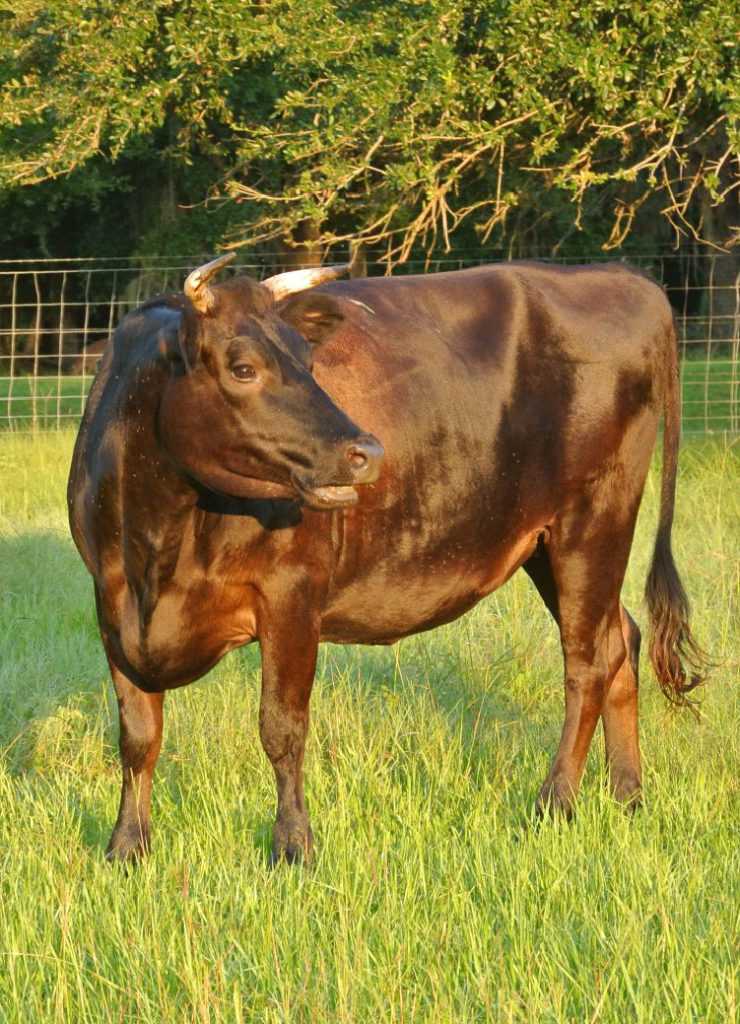
few minutes of enjoyment I might derive from eating that item.
This convergence in Paul, Bruce and Alka’s answers underscores the view that animal rescue is not as much about filling up sanctuaries with animals saved from slaughter, as it is approaching our entire food system with fresh eyes. (See also Philip Lymbery’s book Farmageddon: The True Cost of Cheap Meat). npr.org; “Does Being Vegan Really Help Animals.”
Reduce Violence in the World
The Golden Rule, “Do unto others as you would have others do onto you,” Is one of the uniting principles in the world’s major religious traditions. In Judaism, it is taught, “What is hateful to you, do not to your fellowmen.” — Talmud, Shabbat 31a Christianity teaches, “Whatever ye would that men should do to you, do you even so to them.” — Matthew 7:12. The followers of Islam declare, “No one of you is a believer until he desires for his brother that which he desires for himself.” — Sunnah, Hadith. In Confucianism it is said, “Surely it is the maxim of loving kindness: Do not unto others that which you would not have them do unto you.” — Analects 15.23. Buddhism also teaches, “Hurt not others in ways that you yourself would find hurtful.” — UdanaVarga 5.18. And finally, in the world’s earliest religious scriptures, the Vedic literature, we find, “This is the sum of duty: Do naught unto others which would cause you pain if done unto you.” — Mahabharata 5.1517.
The world of science echoes the world’s religions with its own equivalent of the Golden Rule. Newton’s Third Law of Motion says “For every action, there is an equal and opposite reaction.” While Newton’s law applies only to material nature, the implications run deeper still, extending to the most subtle levels of existence. In the East, this is called the law of Karma.
In a very fundamental sense, too, this law relates to our treatment of animals. The violence in society is at least in part the result of our merciless diet and abuse of the natural world around us. In karmic terms, violence begets violence. In dietary terms, you are what you eat.”– Food for the Spirit, Steven Rosen
“Srila Prabhupada: […] But in the western country the cows are specially being killed. Now the reaction is war, crime, and they are now repentant. And they will have to repent more and more. Jayatirtha: So the wars and the crime are a direct result of the cow slaughter. Prabhupada: Oh, yes. Oh, yes. It is a wholesale reaction. All these crises are taking place.[…]” — from talk with writer and editing manager of Playboy Magazine and Srila Prabhupada, July 5, 1975, Chicago
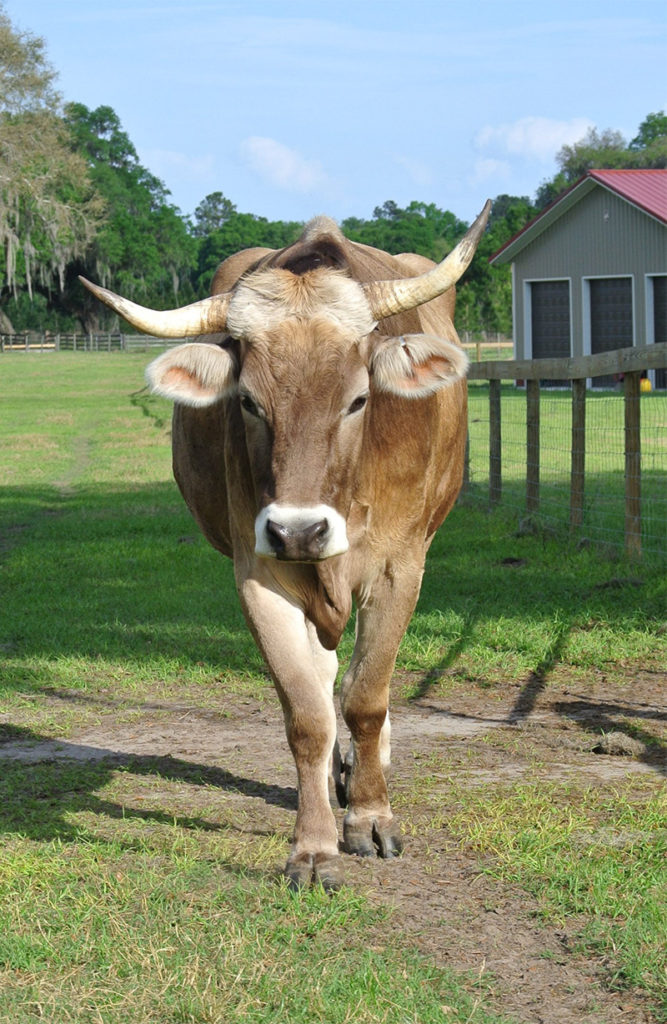


7016 SE 92 Terrace
Gainesville, FL 32641 USA
Phone: 352-792-6777
E-mail ISCOWP
Keep up with the latest news from ISCOWP. Sign up with your e-mail address to receive updates.
"*" indicates required fields
© 2023 This is the only official site of The International Society for Cow Protection, Inc. (ISCOWP) incorporated in 1990, located only in Gainesville, FL, USA. ISCOWP and The Lotus/Cow symbol are registered service marks of The International Society for Cow Protection, Inc. Website content can not be reproduced without permission.